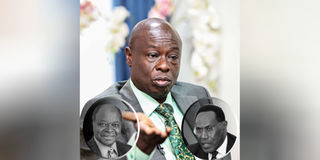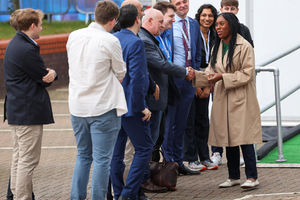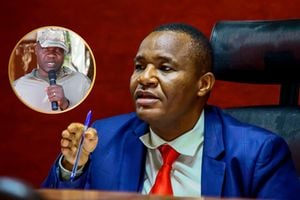
Deputy President Rigathi Gachagua. George Saitoti (inset, right) and Mwai Kibaki (inset, left) served as vice presidents under then-President Daniel arap Moi and were openly criticised by politicians from their own backyards, the fate Mr Gachagua is currently facing.
Kenya has a Deputy President problem. This design problem has bedevilled the country since independence. It first manifested itself in the first government headlined by Kanu stalwarts Mzee Jomo Kenyatta and Vice President Jaramogi Oginga Odinga. But this isn’t merely a constitutional design problem. It’s also a failure of Kenya’s elite political culture to mature and establish predictable traditions.
In the United States, for example, it’s virtually unheard of for the Vice President to openly lambast the President and challenge him to a political duel before the public. In Kenya, however, the executive risks serious dysfunction, or political chaos, if this matter isn’t rectified. We must bite the bullet now, or the bullet will bite us in short order.
I’ve watched with dismay – and pity – as Deputy President Rigathi Gachagua has publicly unsheathed his sword against President William Ruto. Without any subtlety, Mr Gachagua has publicly told the President the Gema (Gikuyu, Meru and Embu) peoples will make his life a living hell if the President “betrays” Mr Gachagua. In other words, Mr Gachagua has told his boss that he is a hostage to Gema for whom he claims to be the tribal kingpin.
Put differently, Mr Gachagua is saying that he and President Ruto have a co-presidency in which he’s not simply the President’s “principal assistant.” In Mr Gachagua’s telling, Gema holds a 47 per cent stake in the country’s government, which he imagines is a shareholding company he calls Kenya Inc.
Co-presidency
If we are to believe Mr Gachagua, the conceptualisers of the 2010 Constitution – of which I was one – created a two-headed hydra in the Executive. Mr Gachagua is both right and wrong. Two things can be right at the same time. Mr Gachagua is right in that the constitutional design of the Executive treats the President and his deputy as one for electoral purposes. The nominee for President “handpicks” his running mate and the two rise or fall together at the presidential polls. The running mate sits a heartbeat away from the President if the pair is elected President and Deputy President. But Mr Gachagua is wrong to imagine a co-presidency simply because he’s elected on the same ticket as the President.
President Ruto could have chosen anyone – even a farmhand – to deputise him. Credible reports indicate that Gema MPs preferred Interior Cabinet Secretary Prof Kithure Kindiki to Mr Gachagua. I am told that only two MPs out of multiple dozens backed Mr Gachagua. Perhaps that’s part of the reason Mr Gachagua sits uncomfortably in that chair because he’s always looking over his shoulder as a pretender to the throne. The shadow of Prof Kindiki must haunt him. Mr Gachagua is wrong to imagine himself the President’s equal, or his kingmaker, because of the Gema vote. My view is that Gema voted for then DP Ruto directly because he had endeared himself to them. He had become the Gema’s kingpin.
Gema also voted for DP Ruto to punish the incumbent Uhuru Kenyatta, their son, whom they regarded as a remote potentate who had come to despise his people or take them for granted. There’s more. Gema also backed DP Ruto to spite Mr Kenyatta for backing Azimio’s Raila Odinga, the dominant political figure who has historically been demonised by Gema politicos among that community. In political terms, Mr Gachagua was a nobody when DP Ruto plucked him from obscurity in the margins of Gema politics and elevated him to be his running mate. I had never heard of the one-term legislator myself until then. But power can quickly go to one’s head, as it apparently has in Mr Gachagua’s case.
Spill blood
President Ruto has only one choice – cut Mr Gachagua down to size immediately. Any procrastination will cast serious doubt on the President’s control over his own government. A subordinate whom you directly appointed cannot pour vitriol on you in public and then you spare him the guillotine. The President must politically decapitate Mr Gachagua with immediate effect to restore constitutional hygiene within the state. He must, as the saying goes, spill blood. That’s the only way he can stamp his authority on the government he was elected to lead. He cannot permit a factotum that he elevated from nowhere to weaken him and render his grip on power tentative. If he does, he will become a lame duck President in his first term, a damning development that has no precedent anywhere.
In the past, we saw the tussle between Mzee Kenyatta and Mr Odinga. Mr Joseph Murumbi didn’t last long either. VP Daniel arap Moi himself was “tortured” in that office, as was Prof George Saitoti. Prof Josephat Karanja’s hubris saw his immediate exit. VP Kalonzo Musyoka had an uneasy existence there. DP Ruto himself fell out with Mr Kenyatta. Only “Uncle” Moody Awori enjoyed the office under President Mwai Kibaki. The answer to the current imbroglio is to impeach Mr Gachagua and amend the Constitution to make it easier to remove the DP.
Makau Mutua is SUNY Distinguished Professor and Margaret W. Wong Professor at Buffalo Law School, The State University of New York. @makaumutua.








